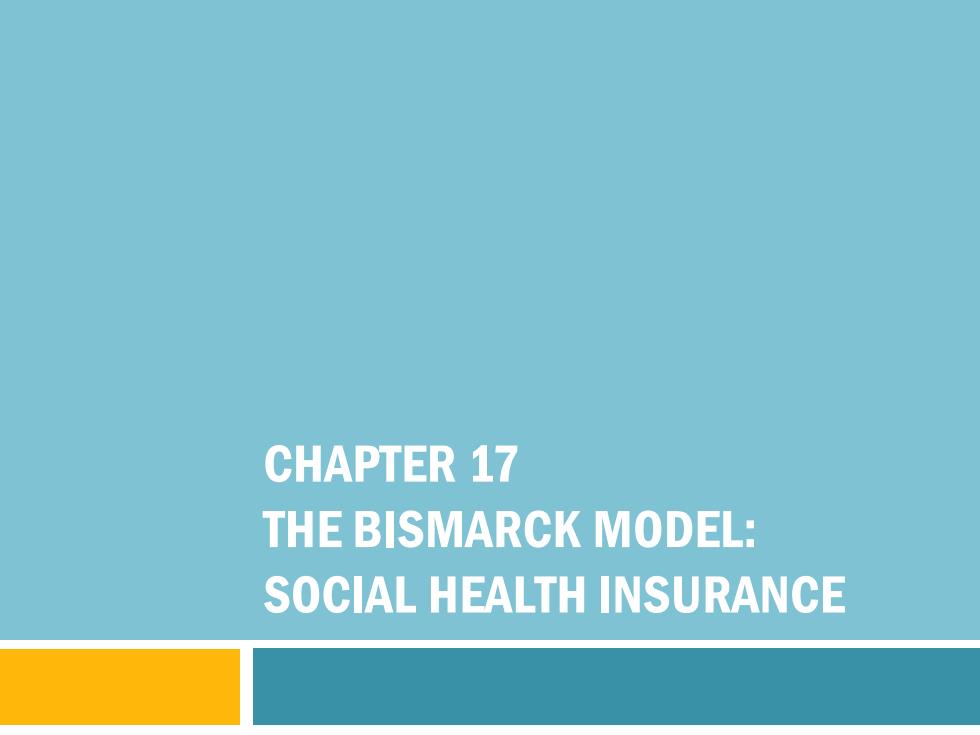
CHAPTER 17 THE BISMARCK MODEL: SOCIAL HEALTH INSURANCE
CHAPTER 17 THE BISMARCK MODEL: SOCIAL HEALTH INSURANCE
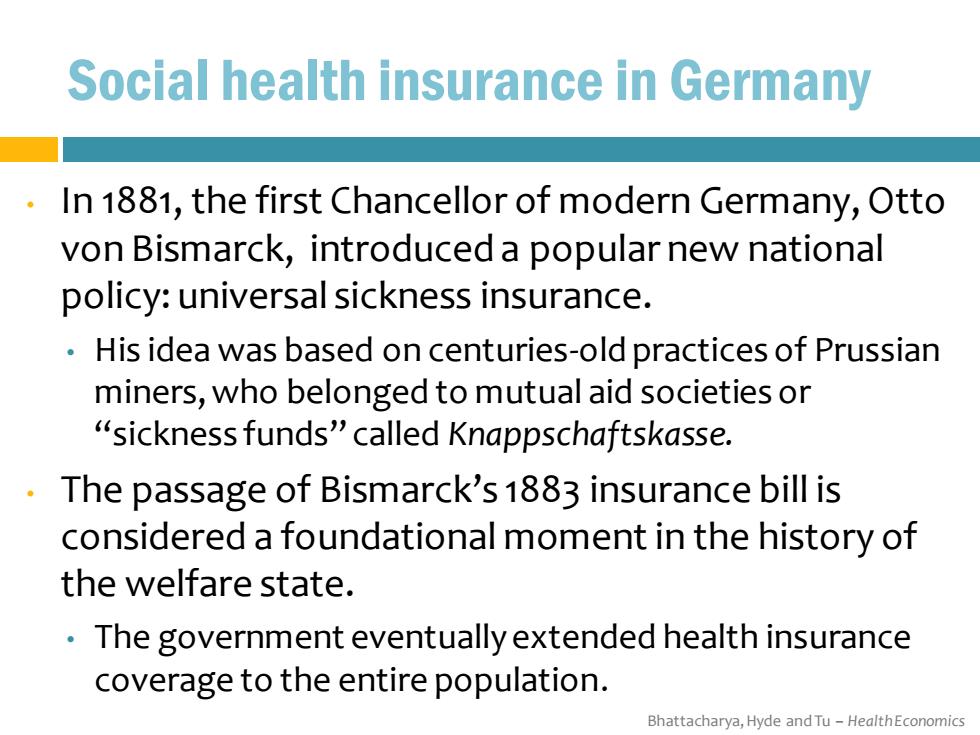
Social health insurance in Germany 。 In 1881,the first Chancellor of modern Germany,Otto von Bismarck,introduced a popular new national policy:universal sickness insurance. His idea was based on centuries-old practices of Prussian miners,who belonged to mutual aid societies or "sickness funds"called Knappschaftskasse. The passage of Bismarck's 1883 insurance bill is considered a foundational moment in the history of the welfare state. The government eventually extended health insurance coverage to the entire population. Bhattacharya,Hyde and Tu-HealthEconomics
Bhattacharya, Hyde and Tu – Health Economics Social health insurance in Germany • In 1881, the first Chancellor of modern Germany, Otto von Bismarck, introduced a popular new national policy: universal sickness insurance. • His idea was based on centuries-old practices of Prussian miners, who belonged to mutual aid societies or “sickness funds” called Knappschaftskasse. • The passage of Bismarck’s 1883 insurance bill is considered a foundational moment in the history of the welfare state. • The government eventually extended health insurance coverage to the entire population

The spread of social health insurance In 1958,Japan passed the National Health Insurance Law,which universally guaranteed health insurance to Japanese citizens. Other East Asian nations like South Korea and Taiwan followed Japan's lead in the late 2oth century. Many health care systems in continental Europe, such as those in France,Switzerland,and the Netherlands,evolved in similar ways Bhattacharya,Hyde and Tu-HealthEconomics
Bhattacharya, Hyde and Tu – Health Economics The spread of social health insurance ❑ In 1958, Japan passed the National Health Insurance Law, which universally guaranteed health insurance to Japanese citizens. ❑ Other East Asian nations like South Korea and Taiwan followed Japan’s lead in the late 20th century. ❑ Many health care systems in continental Europe, such as those in France, Switzerland, and the Netherlands, evolved in similar ways
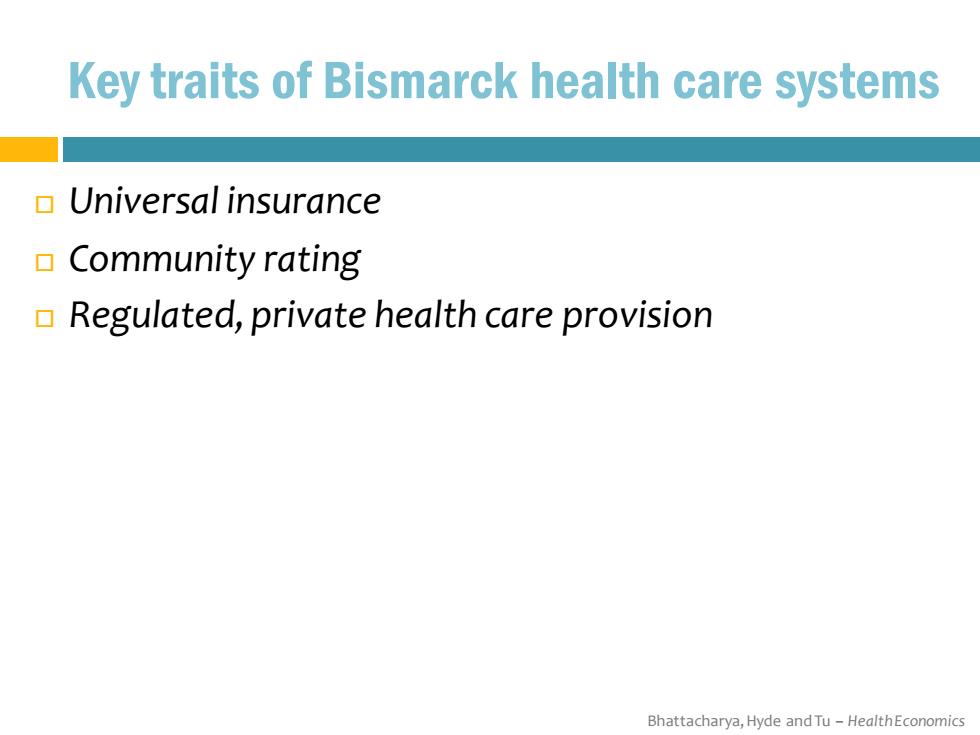
Key traits of Bismarck health care systems Universal insurance Community rating Regulated,private health care provision Bhattacharya,Hyde and Tu-HealthEconomics
Bhattacharya, Hyde and Tu – Health Economics Key traits of Bismarck health care systems Universal insurance Community rating Regulated, private health care provision
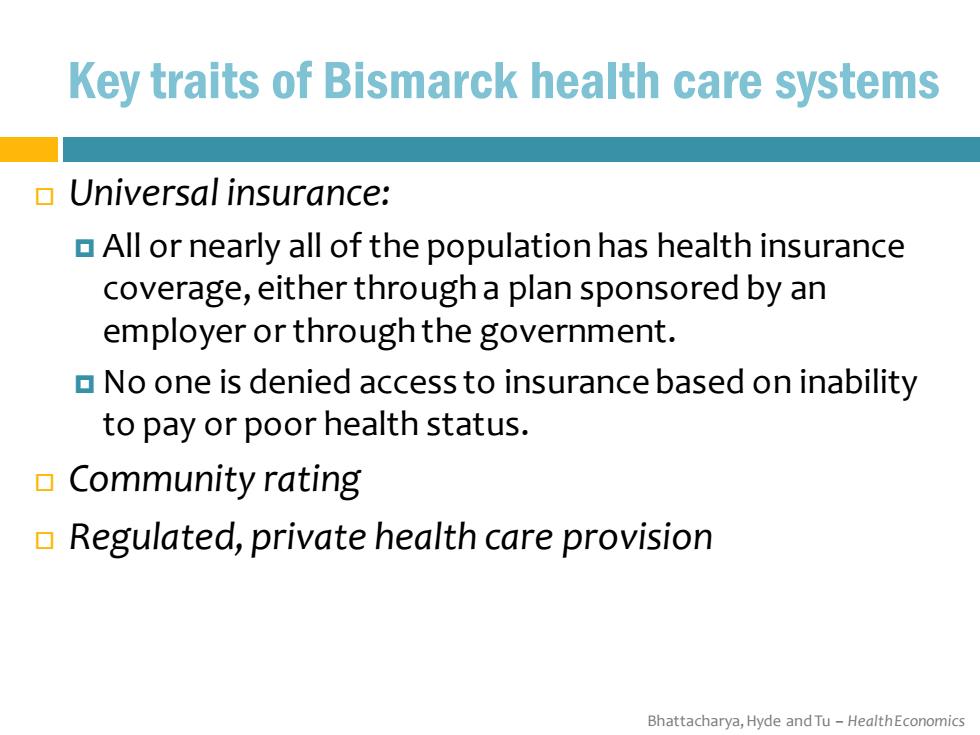
Key traits of Bismarck health care systems Universal insurance: All or nearly all of the population has health insurance coverage,either through a plan sponsored by an employer or through the government. No one is denied access to insurance based on inability to pay or poor health status. Community rating Regulated,private health care provision Bhattacharya,Hyde and Tu-HealthEconomics
Bhattacharya, Hyde and Tu – Health Economics Key traits of Bismarck health care systems Universal insurance: All or nearly all of the population has health insurance coverage, either through a plan sponsored by an employer or through the government. No one is denied access to insurance based on inability to pay or poor health status. Community rating Regulated, private health care provision
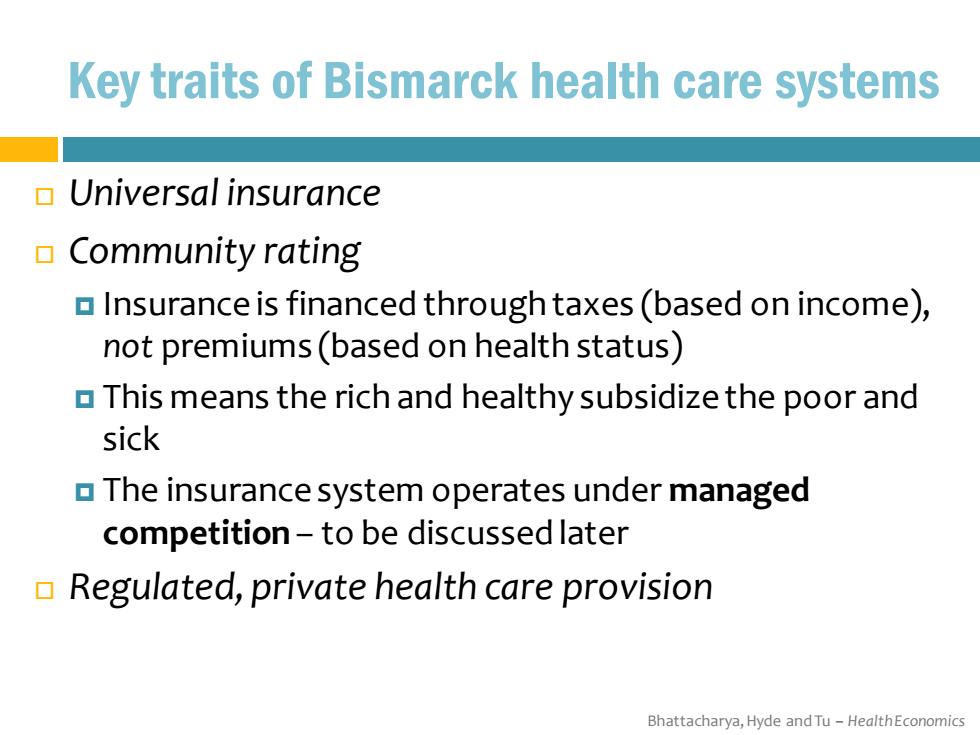
Key traits of Bismarck health care systems Universal insurance Community rating Insurance is financed through taxes(based on income), not premiums(based on health status) This means the rich and healthy subsidize the poor and sick The insurance system operates under managed competition-to be discussed later Regulated,private health care provision Bhattacharya,Hyde and Tu-HealthEconomics
Bhattacharya, Hyde and Tu – Health Economics Key traits of Bismarck health care systems Universal insurance Community rating Insurance is financed through taxes (based on income), not premiums (based on health status) This means the rich and healthy subsidize the poor and sick The insurance system operates under managed competition – to be discussed later Regulated, private health care provision
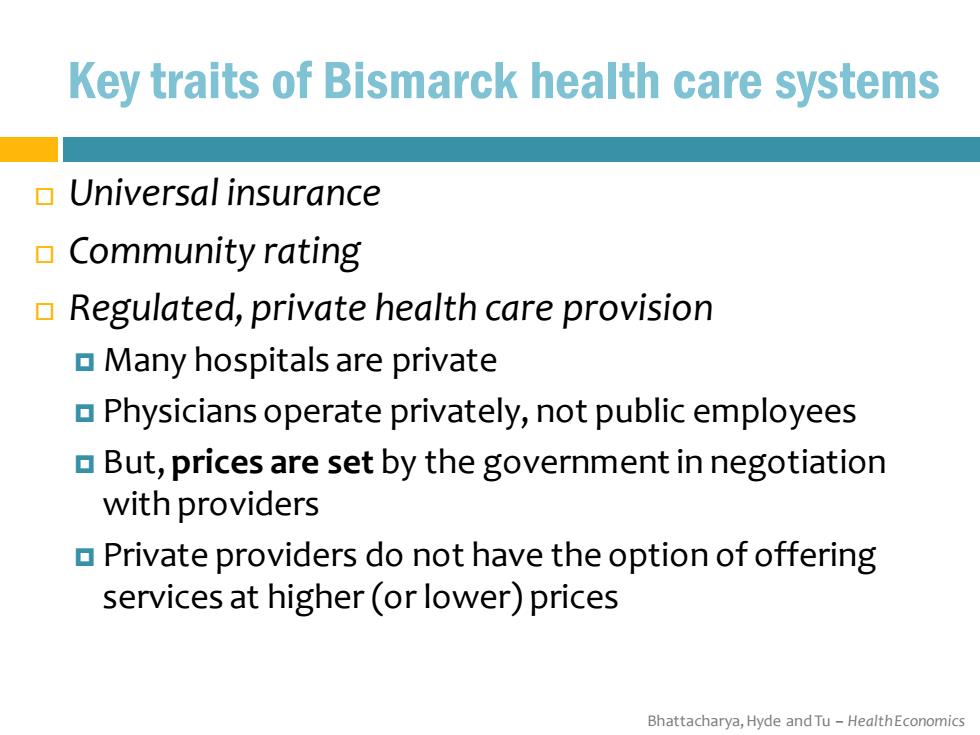
Key traits of Bismarck health care systems ▣Universal insurance Community rating Regulated,private health care provision Many hospitals are private Physicians operate privately,not public employees But,prices are set by the government in negotiation with providers Private providers do not have the option of offering services at higher(or lower)prices Bhattacharya,Hyde and Tu-HealthEconomics
Bhattacharya, Hyde and Tu – Health Economics Key traits of Bismarck health care systems Universal insurance Community rating Regulated, private health care provision Many hospitals are private Physicians operate privately, not public employees But, prices are set by the government in negotiation with providers Private providers do not have the option of offering services at higher (or lower) prices
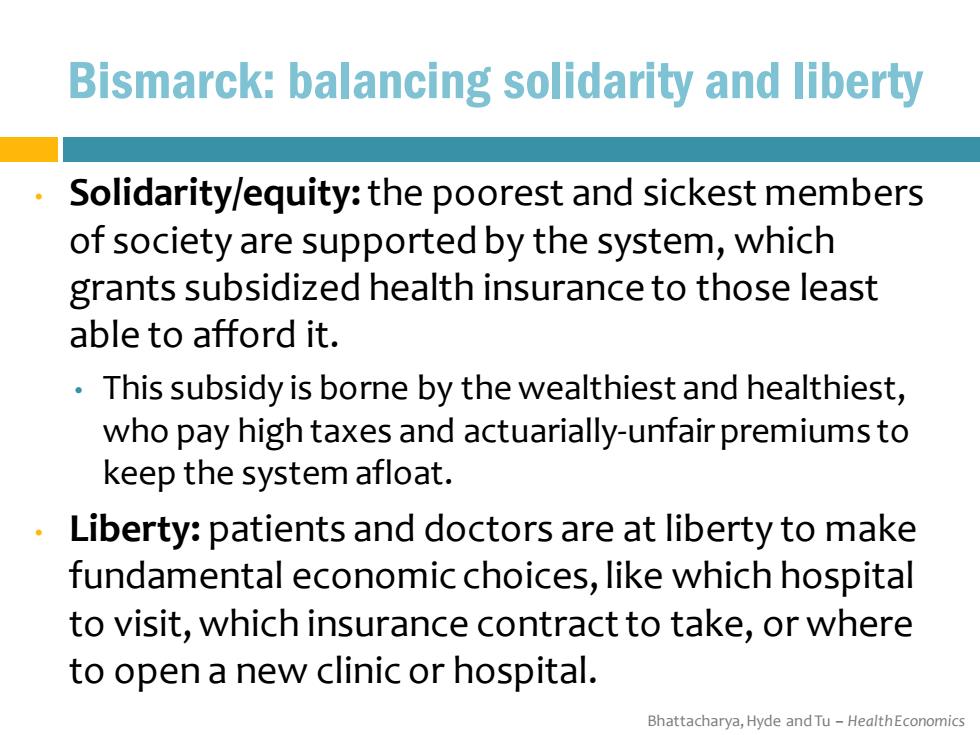
Bismarck:balancing solidarity and liberty 。 Solidarity/equity:the poorest and sickest members of society are supported by the system,which grants subsidized health insurance to those least able to afford it. This subsidy is borne by the wealthiest and healthiest, who pay high taxes and actuarially-unfair premiums to keep the system afloat. Liberty:patients and doctors are at liberty to make fundamental economic choices,like which hospital to visit,which insurance contract to take,or where to open a new clinic or hospital. Bhattacharya,Hyde and Tu-HealthEconomics
Bhattacharya, Hyde and Tu – Health Economics Bismarck: balancing solidarity and liberty • Solidarity/equity: the poorest and sickest members of society are supported by the system, which grants subsidized health insurance to those least able to afford it. • This subsidy is borne by the wealthiest and healthiest, who pay high taxes and actuarially-unfair premiums to keep the system afloat. • Liberty: patients and doctors are at liberty to make fundamental economic choices, like which hospital to visit, which insurance contract to take, or where to open a new clinic or hospital
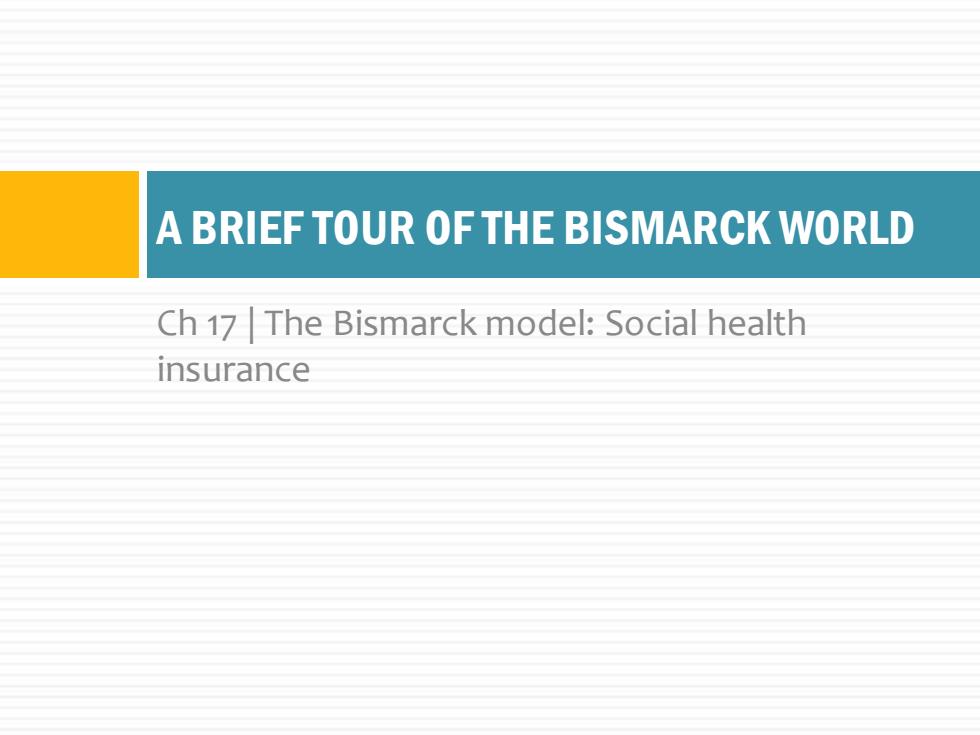
A BRIEF TOUR OF THE BISMARCK WORLD Ch 17 The Bismarck model:Social health insurance
Ch 17 | The Bismarck model: Social health insurance A BRIEF TOUR OF THE BISMARCK WORLD
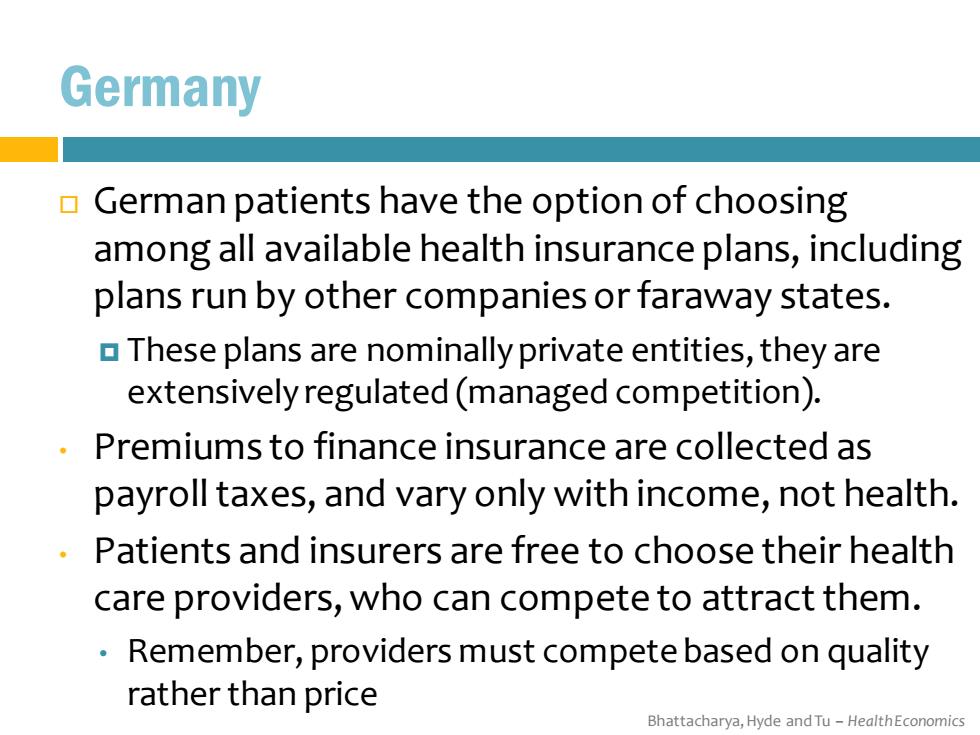
Germany German patients have the option of choosing among all available health insurance plans,including plans run by other companies or faraway states. These plans are nominally private entities,they are extensively regulated (managed competition). Premiums to finance insurance are collected as payroll taxes,and vary only with income,not health. Patients and insurers are free to choose their health care providers,who can compete to attract them. Remember,providers must compete based on quality rather than price Bhattacharya,Hyde and Tu-HealthEconomics
Bhattacharya, Hyde and Tu – Health Economics Germany German patients have the option of choosing among all available health insurance plans, including plans run by other companies or faraway states. These plans are nominally private entities, they are extensively regulated (managed competition). • Premiums to finance insurance are collected as payroll taxes, and vary only with income, not health. • Patients and insurers are free to choose their health care providers, who can compete to attract them. • Remember, providers must compete based on quality rather than price